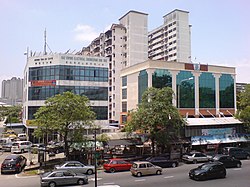Sungai Pinang
Sungai Pinang | |
|---|---|
Neighbourhood of George Town | |
| Other transcription(s) | |
| • Chinese | 双溪槟榔 (Simplified) 雙溪檳榔 (Traditional) Shuāng xī bīn láng (Pinyin) |
 | |
| Coordinates: 5°24′24.5514″N 100°19′10.6896″E / 5.406819833°N 100.319636000°E | |
| Country | |
| State | |
| City | |
| Government | |
| • Local government | Penang Island City Council |
| • Mayor of Penang Island | Rajendran P. Anthony |
| • Sungai Pinang State Assemblyman | Lim Siew Khim (DAP) |
| • Jelutong Member of Parliament | RSN Rayer (DAP) |
| Time zone | UTC+8 (MST) |
| • Summer (DST) | Not observed |
| Postal code | 10150 |
| Website | mbpp |
Sungai Pinang is a residential neighbourhood within the downtown core of George Town in the Malaysian state of Penang. The neighbourhood lies along the southern bank of the Pinang River and is bounded by Jalan Sungai Pinang to the south.[1][2][3]
Etymology
The neighbourhood of Sungai Pinang was named after the Pinang River, which, in turn, is named after the Pinang palm, scientifically known as areca catechu.[4]
History

The Malay and Indian villages along the Pinang River date back to the 18th century, possibly predating Captain Francis Light's arrival on Penang Island in 1786.[3] Sumatran traders had arrived at the river's estuary in the 1780s and established settlements like Kampung Rawa and Kampung Makam.[1][2][3][5] Ethnic Tamils also settled along the river; whilst some professed their Muslim faith, others retained their Hindu beliefs and built a handful of Hindu temples along the river bank.
The existence of Muslim and Hindu places of worship located adjacent to one another had in the past provoked racial and religious tensions. In 1998, a minor religious clash broke out over the relocation of a Hindu temple at Kampung Rawa, where a Christian boy called R.Sasikumar was dating Indian-Muslim girl named Fina.[6][7] What had begun as an altercation over the relatively trivial issue of the noise levels of the Hindu prayer bells turned deadly, leaving four fatalities. Almost 200 rioters were arrested in response to the incident.
Among the more recent issues affecting this neighbourhood are the pollution of the Pinang River and perennial flash floods, as the neighbourhood sits on low-lying land adjacent to the river.[8][9][10] Efforts have been made by the Penang state government to clean up the Pinang River and alleviate the flash floods, including the use of technology and river dredging works.[11][12][13]
Transportation
Rapid Penang buses 12, 301, 302, 303 and 401 serve the neighbourhood, connecting it with various destination in the city, including Bukit Jambul, Bayan Baru, Bayan Lepas, Batu Maung and Balik Pulau.[14][15][16]
Demographics
The following is based on the 2020 Malaysian Census conducted by Malaysia's Department of Statistics.[17]
| Ethnicity | Population | Percentage (%) |
|---|---|---|
| Chinese | 25,971 | 46.83 |
| Malay | 18,993 | 34.25 |
| Indian | 6,978 | 12.58 |
| Other ethnicities | 525 | 0.95 |
| Non-Malaysian citizens | 2,995 | 5.39 |
| Total | 55,462 | 100.00 |
Education
There is one Tamil-medium primary school and a Japanese international school within the Sungai Pinang neighbourhood.
Primary school
- SRJK (T) Jalan Sungai[19]
International school
- Penang Japanese School[20]
References
- ^ a b "Muslim Heritage in George Town" (PDF). George Town World Heritage Incorporated.
- ^ a b "Muslim Heritage in George Town" (PDF). George Town World Heritage Incorporated.
- ^ a b c "Newsletter September 2015" (PDF). Penang Heritage Trust.
- ^ Simon Gardner, Pindar Sidisunthorn and Lai Ee May, 2011. Heritage Trees of Penang, p. 206. Penang: Areca Books. ISBN 978-967-57190-6-6
- ^ Murugasu, Sheila (2017). The State and the Transnational Politics of Migrants: A Study of the Chins and the Acehnese in Malaysia. Springer. ISBN 9781137370617.
- ^ Dan Landis, Rosita D. Albert (2012). Handbook of Ethnic Conflict: International Perspectives. Springer. ISBN 9781461404484.
- ^ Rashid, Syerleena Abdul (2015-08-20). "Worsening inter-religious relations - Aliran". Aliran. Retrieved 2017-05-22.
- ^ Sekaran, R. "Flash floods hit Penang as Sungai Pinang bursts its banks – Nation | The Star Online". Retrieved 2017-05-22.
- ^ "Hentikan Pencemaran di Punca Untuk Sungai Pinang Yang Lebih Sihat dan Bersih | Buletin Mutiara". www.buletinmutiara.com. Retrieved 2017-05-22.
- ^ "Poor drainage cause of flash flood in Penang". 2016-10-29. Retrieved 2017-05-23.
- ^ "Penang signs RM5.8m deal to bring dead river back to life". 2014-05-15. Retrieved 2017-02-28.
- ^ "Sungai Pinang goes green with the help of technology". 2016-07-05. Retrieved 2017-02-28.
- ^ "Dredging work to start at Penang rivers – Nation | The Star Online". www.thestar.com.my. Retrieved 2017-05-23.
- ^ Route map rapidpg.com.my
- ^ Route map rapidpg.com.my
- ^ Route map rapidpg.com.my
- ^ "Population Distribution and Basic Demographic Characteristics, 2010" (PDF). Department of Statistics, Malaysia. Archived from the original (PDF) on 22 May 2014. Retrieved 19 April 2012.
- ^ "Battle in a Crowded Ring". The Star. 29 April 2018.
- ^ "SJK(T) JALAN SUNGAI – PULAU PINANG – Carian Sekolah Malaysia". www.sekolahmy.com (in Malay). Retrieved 2017-05-19.
- ^ "Main page". Penang Japanese School.

